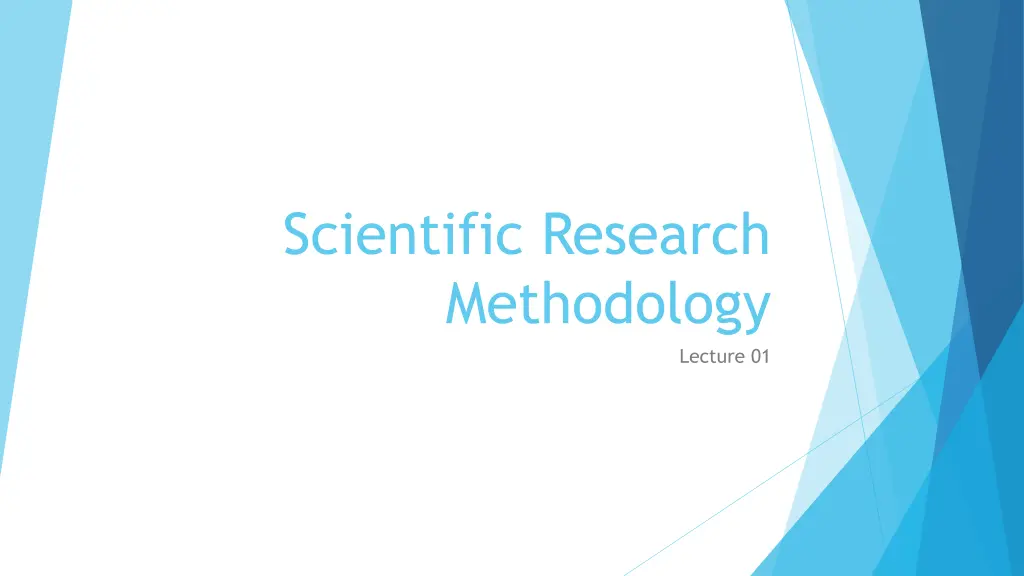
Understanding Scientific Research Methodology: A Comprehensive Overview
Explore the fundamentals of scientific research methodology in this informative lecture slide set, covering the definition of research, purposes of conducting research, characteristics and requirements of a systematic inquiry, and more. Dive into the essential concepts that drive the process of creating new knowledge and solving problems through structured scientific methods.
Download Presentation

Please find below an Image/Link to download the presentation.
The content on the website is provided AS IS for your information and personal use only. It may not be sold, licensed, or shared on other websites without obtaining consent from the author. If you encounter any issues during the download, it is possible that the publisher has removed the file from their server.
You are allowed to download the files provided on this website for personal or commercial use, subject to the condition that they are used lawfully. All files are the property of their respective owners.
The content on the website is provided AS IS for your information and personal use only. It may not be sold, licensed, or shared on other websites without obtaining consent from the author.
E N D
Presentation Transcript
Scientific Research Methodology Lecture 01
What is Research? Grinnell (1993, p.4): research is a structured inquiry that utilises acceptable scientific methodology to solve problems and creates new knowledge that is generally applicable . Burns (1997, p. 2) a systematic investigation to find answers to a problem .
Why do we do Research? Find answers to your questions o Solve a research problem o Generating new knowledge o Establish facts and principles o
Characteristics & Requirements Systematic This implies that the procedures adopted to undertake an investigation follow a certain logical sequence. The different steps cannot be taken in a haphazard way. Some procedures must follow others.
Characteristics & Requirements Empirical Any conclusions drawn are based upon hard evidence gathered from information collected from real-life experiences or observations.
Characteristics & Requirements Cyclical Research starts with a problem and ends with a problem.
Characteristics & Requirements Valid and Verifiable This concept implies that whatever you conclude on the basis of your findings is correct and can be verified by you and others.
Characteristics & Requirements Rigorous You must be meticulous in ensuring that the procedures followed to find answers to questions are relevant, appropriate and justified.
Philosophy, Approach, Methodology and Research Design
Qualitative Research It is an approach for exploring and understanding the meaning individuals or groups ascribe to a social or human problem. The research process questions and procedures, data typically collected in the participant s setting, data analysis inductively building from particulars to general themes, making interpretations of the meaning of the data. involves emerging and the researcher The final written report has a flexible structure. Those who engage in this form of inquiry use an inductive style building from data to themes and a focus on individual meaning and emphasizing the importance of reporting the complexity of a situation.
Quantitative Research It is an approach for testing objective theories by examining the relationship among variables or a comparison among groups. These variables, in turn, can be measured, typically on instruments, so that numbered data can be analysed procedures. using statistical Quantitative researchers test theories deductively, build into a study protections against bias, control counterfactual explanations, and seek to generalize and replicate the findings. for alternative or
Mixed-methods Research It is an approach to inquiry involving collecting both quantitative and qualitative data, using a specific procedure or design, combining (or integrating) the two forms of data within the design, conclusions about the insight to emerge from the combined databases. and drawing
Research Designs Research designs are types of inquiry within qualitative, quantitative, and mixed methods approaches that provide specific direction for procedures in a research study.
Experimental research involves a study of the effect of the systematic manipulation of one variable(s) on another variable true experiment, the researcher must use a random process such as a coin toss to assign available subjects to the experimental treatments. Quasi-experiment . When the researcher cannot randomly assign subjects to experimental treatments for a study. Instead, he uses already assembled groups. nonexperimental quantitative research, the researcher identifies variables and may look for relationships among them but does not manipulate the variables. Ex post facto research is similar to an experiment, except the researcher does not manipulate the independent variable, which has already occurred in the natural course of events. The researcher simply compares groups differing on the preexisting independent variable to determine any relationship to the dependent variable. Correlational research gathers data from individuals on two or more variables and then seeks to determine if the variables are related (correlated). Survey research uses instruments such as questionnaires and interviews to gather information from groups of individuals.
A case study is a type of ethnographic research study that focuses on a single unit, such as one individual, one group, one organization, or one program. The goal is to arrive at a detailed description and understanding of the entity (the case ). Content analysis focuses on analyzing and interpreting recorded material to learn about human behavior. The material may be public records, textbooks, letters, films, tapes, diaries, themes, reports, websites, or other documents. Ethnography is an in-depth study of naturally occurring behavior within a culture or social group. Social scientists sometimes call ethnography field research because it is conducted in a natural setting or field. Grounded theory research is designed to develop a theory of social phenomena based on the field data collected in a study. Historical research analyzes documents and artifacts and/or uses interviews with eyewitnesses to gain insight into past events.
Research in Economics, Management and Business Sciences What do you think?
